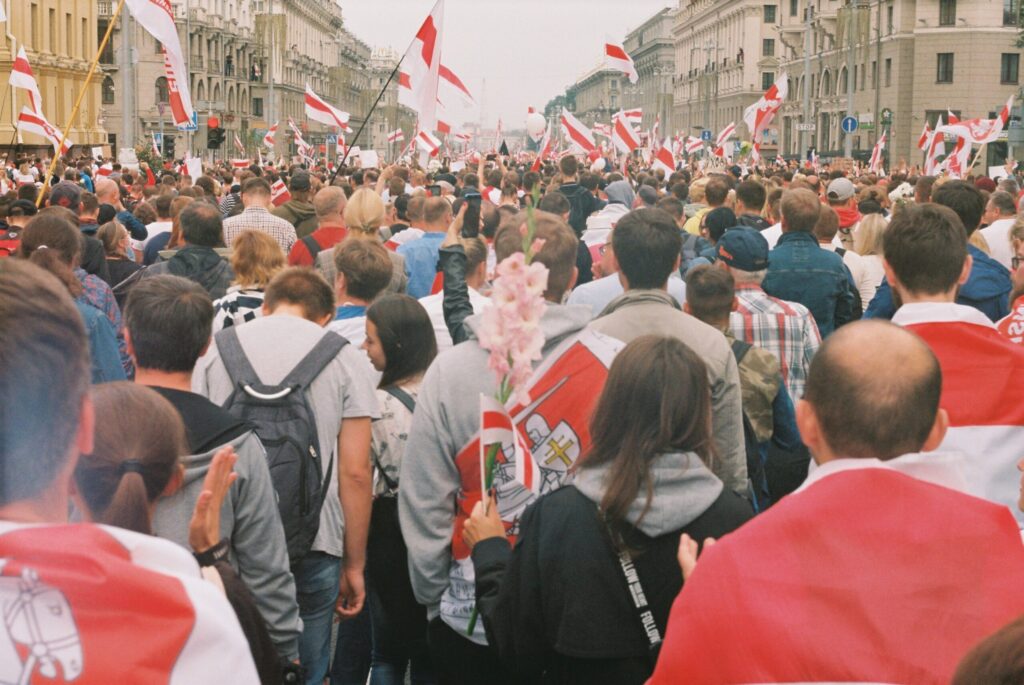Although the constitution of Belarus originally declared that a president could serve for a maximum of two terms (a total of 10 years), Alexander Lukashenko — the first and only democratically elected leader of the country — has been in power since he was instated over 26 years ago. By removing the term restriction at the end of his second stint in office, he has been able to rule Belarus as if it were his own personal kingdom, which, until now, has gone largely unnoticed by the rest of the world. Over the years, Lukashenko has projected an illusion of democracy by continuing to hold elections, even though all but the first have been rigged.
Lukashenko managed to keep firm control over his country through a variety of methods, several of which involve intimidating the people of Belarus into acquiescence. Due to presidential decrees from 1999 that modify Belarusian labor law, the vast majority of workers in the country now work under short-term contracts, rather than the long-term or permanent job contracts that were common prior to the decrees.
Since then, those vocal about their unhappiness with the state of Belarusian politics run the risk of losing their contract renewals and therefore their jobs. Besides attacks on job security, Lukashenko’s brutal treatment of protestors also serves to dissuade the people of Belarus from challenging him. The OMON, Belarus’ special forces police units, have long been used to break up protests and are notorious for their harsh tactics and inhumane treatment, often beating protestors and packing them into jail cells filled past capacity.
However, despite attempts to cow the people of Belarus into submission, the results of the 2020 presidential election, where Lukashenko was said to have garnered 80% of the vote and soundly defeated challenger Svetlana Tikhanovskaya, have led to countrywide protests that don’t appear to be slowing down. Even state factory workers, who have historically supported Lukashenko , have taken to the streets in objection to the election results. Tikhanovskaya decided to run for president as a symbolic action after her husband Sergei Tikhanovskaya, a popular blogger and Youtuber who discusses political issues in Belarus, was not allowed to register as a presidential candidate and was subsequently jailed for causing public unrest.
Despite being forced to leave the country after the election, Svetlana Tikhanovskaya has promised to continue standing in opposition to Lukashenko, and has encouraged protestors to step up their actions, even as pressure from the government and authorities increases.
In the past, President Lukashenko has been able to overcome tumultuous periods with the backing of Russia, but this time may be different. He has always made it clear that he is a strong advocate for a close relationship between the two countries, and the larger country has always supported him, preferring the benefits of a current pro-Russia leader to the risk that Lukashenko’s successor might cut ties. However, for the past few years Lukashenko has been putting off any concrete actions towards realizing the Union State integration, much to Russia’s increasing annoyance. 20 years ago, both countries agreed to be part of a unique relationship, where each maintained jurisdiction over its own territory but had united social, economic, and foreign policies, as well as a single parliament and shared currency. Lukashenko seems to have changed his mind and no longer wants to go through with it, calling it an overstep of Belarusian sovereignty.
In early August, prior to the election, Lukashenko arrested 33 Russian mercenaries, whom he believed were sent to overthrow his regime, and threatened to send them to Ukraine instead of returning them to Russia. Furthermore, current protests in Belarus have not shown any anti-Russian sentiment, solely anger at Lukashenko, but Kremlin support for the Belarusian president could quickly change that. After a call between Lukashenko and Putin, Russia pledged to assist Belarus if there was an external security threat, but said nothing about getting involved in the internal affairs of the smaller country. Lukashenko’s inconsistent actions and feelings towards Russia, paired with Tikhanovskaya’s vocal willingness to maintain relationships with Russia may have Putin reconsidering his support of the current Belarusian president.
The protests are also drawing widespread international attention, with many countries around the world not recognizing Lukashenko as the winner and calling for a fair reelection. The Nordic-Baltic Eight — Denmark, Estonia, Finland, Iceland, Latvia, Lithuania, Norway, and Sweden — and the Visegrad Group — the Czech Republic, Hungary, Poland, and Slovakia — have both condemned the state-sanctioned use of violence against protestors. Other individual countries, such as Ukraine, Germany, Canada and Britain, among others, have expressed similar sentiments alongside the European Union, which plans to bring sanctions against those involved in the election fraud and the suppression of protests.
Lukashenko has seen his fair share of tumult and protest during his 26-year-long reign, but the world’s eyes are on Belarus now, and it seems as though Lukashenko will not be able to get away with his old tricks once more.







